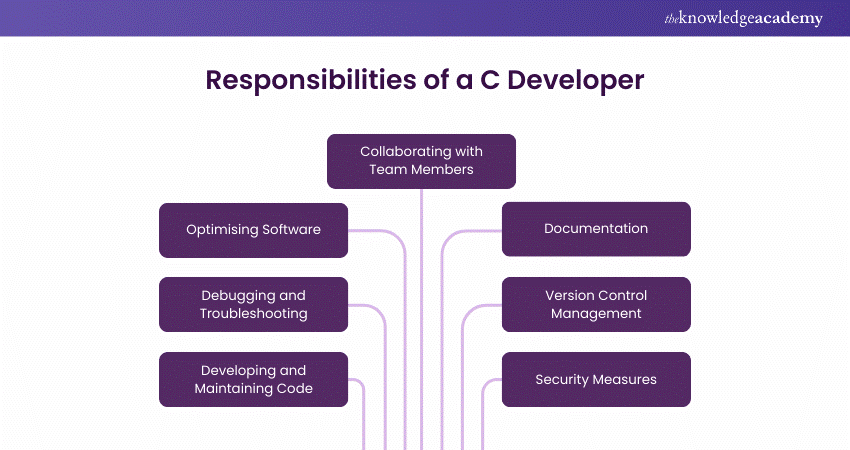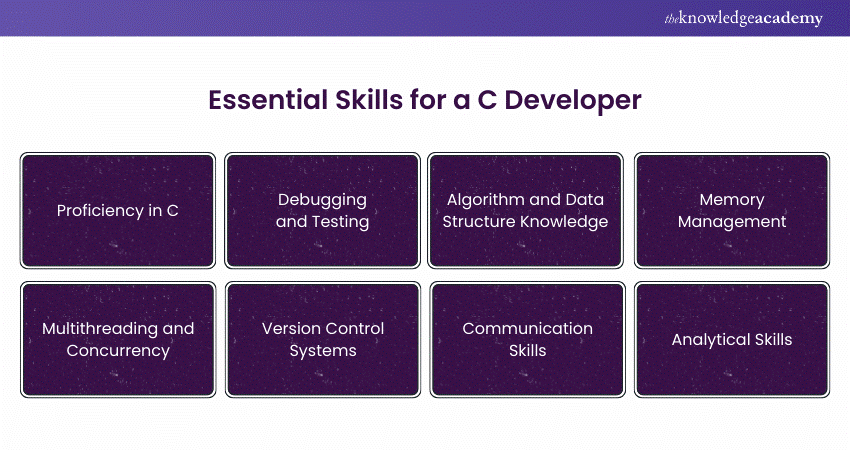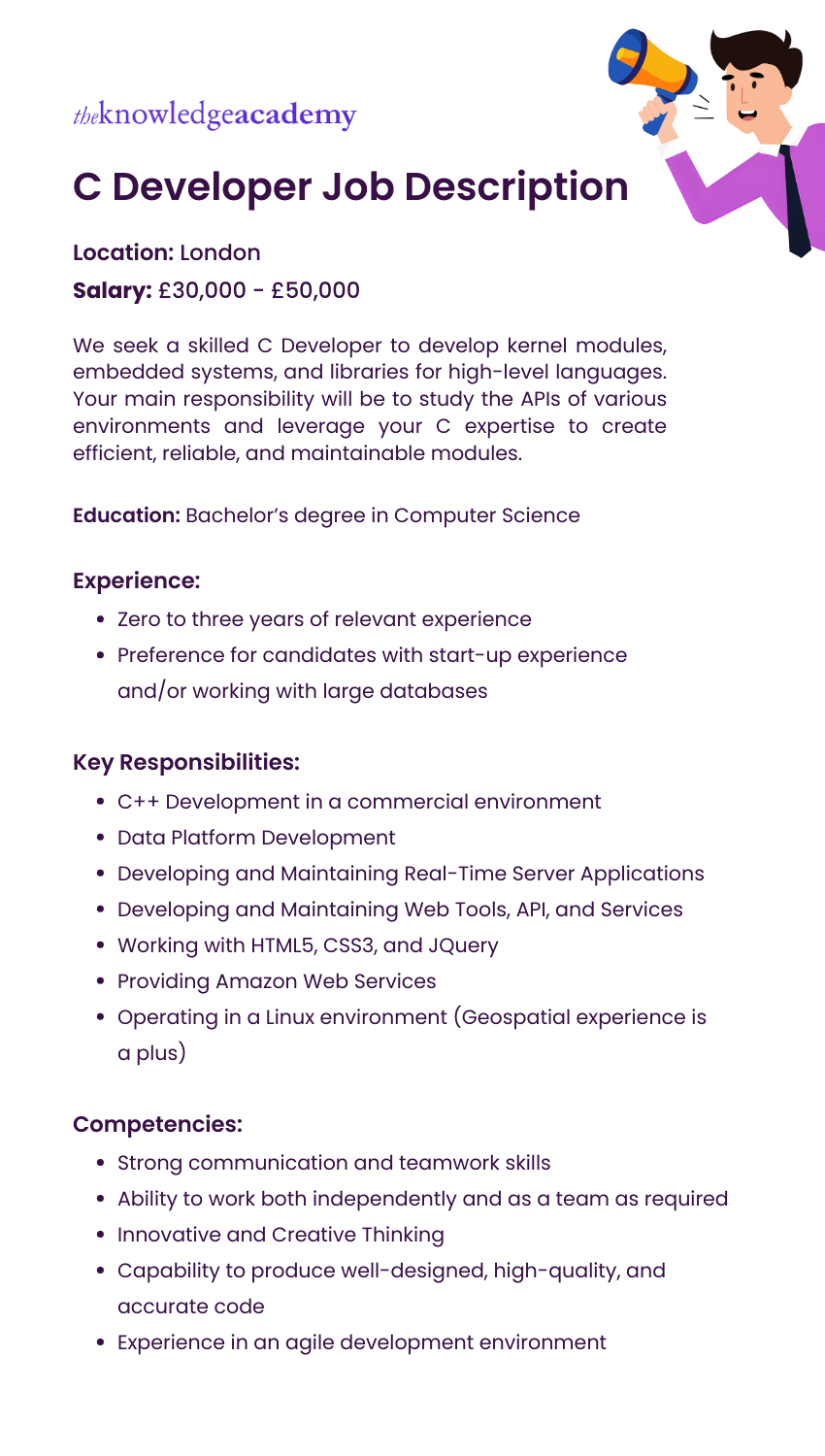We may not have the course you’re looking for. If you enquire or give us a call on +64 98874342 and speak to our training experts, we may still be able to help with your training requirements.
Training Outcomes Within Your Budget!
We ensure quality, budget-alignment, and timely delivery by our expert instructors.

Have you ever wondered who ensures your favourite applications and systems run smoothly? It’s the dedicated C Developers who make it all possible. If you’re passionate about programming and curious about their role, exploring the C Developer Job Description will provide valuable insights.
As you delve deeper into the C Developer's role, you might find yourself curious about the key responsibilities and skills needed for this position. From writing code and debugging to collaborating and implementing security measures, the C Developer's job is multifaceted. Whether you're an aspiring C Developer or a Hiring Manager, understanding the intricacies of the C Developer Job Description is essential. Let’s dive in!
Table of Contents
1) What Does a C Developer do?
2) Responsibilities of a C Developer
3) Requirements for a C Developer
4) Essential Skills of C Developer
5) C Developer Job Description Example
6) Conclusion
What Does a C Developer do?
A C Developer is a software professional who specialises in the C programming language, which is one of the oldest and most widely used programming languages. They develop, test, and maintain applications and systems software, often working on Operating Systems, Embedded Systems, and high-performance computing projects.
C Developer role is critical in industries like finance, telecommunications, and gaming, where efficient and reliable software is essential. C Developers ensure the smooth operation of complex systems, contributing to the stability and performance of crucial software applications across various sectors.
Responsibilities of a C Developer
The responsibilities of a C Developer can vary according to the industry and work role. However, some common responsibilities include:

1) Developing and Maintaining Code: Write efficient, reusable, and reliable C code, including designing algorithms and Data Structures.
2) Debugging and Troubleshooting: Identify and fix software bugs through Usability Testing in Software Testing and debugging to ensure correct functionality.
3) Optimising Software: Improve software performance by optimising code and managing memory efficiently.
4) Collaborating with Team Members: Work with other developers, engineers, and stakeholders to gather requirements and design solutions.
5) Documentation: Create and maintain code and system documentation, including user manuals.
6) Version Control Management: Use Version Control systems like Git to handle code changes and collaborate on development.
7) Security Measures: Use security best practices to protect software, write secure code, and perform regular security audits.
Ready to master C programming? Join our engaging C Programming Training and kickstart your coding journey today!
Requirements for a C Developer
To become a successful C Developer, candidates typically need to meet several educational and experiential requirements:
1) Educational Background: Bachelor's degrees in Computer Science, Information Technology, or another associated field are typically necessary. Advanced degrees or relevant certifications can be advantageous.
2) Experience: Prior experience in Software Development, especially with the C programming language, is highly valued. This experience may include internships or previous job roles.
Unlock the power of C programming and transform your coding skills with our comprehensive, expert-led C Programming Course today!
Essential Skills for a C Developer
A C Developer needs a mix of technical and soft skills to flourish in their role:

1) Technical Skills
a) Proficiency in C: Deep understanding of the C programming language, including its syntax, semantics, and standard libraries.
b) Related Technologies: Knowledge of related technologies and languages, such as C++, Python, or Assembly, can be advantageous.
c) Debugging and Testing: Capability to debug and test code effectively, using tools and techniques to identify and fix issues.
d) Algorithm and Data Structure Knowledge: Strong grasp of algorithms and Data Structures, essential for writing efficient and optimised code.
e) Memory Management: Expertise in managing memory manually, a critical aspect of C programming.
f) Multithreading and Concurrency: Experience with multithreading and concurrent programming to develop high-performance applications.
g) Version Control Systems: Expertise using Version Control systems like Git to manage code changes and work with others.
2) Soft Skills
a) Analytical Skills: Strong abilities to analyse and solve problems are important for identifying and resolving software issues.
b) Communication Skills: Strong verbal and Written Communication Skills are important for collaborating with teammates and documenting work.
c) Teamwork: Ability to work well in a team, communicate efficiently, and collaborate with other developers and stakeholders.
Enhance your programming expertise with our C# Programming (C Sharp) Course and take your career to the next level!
C Developer Job Description Example

Elevate your career with our Introduction Of Embedded C Programming Course and become a proficient Embedded Systems Developer!
Conclusion
A C Developer plays a pivotal role in ensuring the seamless operation of applications and systems. By exploring the C Developer Job Description, one can appreciate the challenging and rewarding nature of this role. These developers create efficient, reliable software that drives technological advancements and ensures the smooth operation of critical systems.
Take your programming to the next level with the C++ Programming (C Plus Plus) Course - sign up now to expand your coding capabilities and impact!
Frequently Asked Questions

C has four primary data types: basic (int, char, float, double), derived (arrays, pointers, functions), enumeration (enum), and void. These types form the foundation for variable declaration and manipulation in C programming.

C is considered a middle-level language. It incorporates the characteristics of both high-level and low-level languages, offering powerful abstractions for Software Development while allowing direct manipulation of hardware and memory.

The Knowledge Academy takes global learning to new heights, offering over 30,000 online courses across 490+ locations in 220 countries. This expansive reach ensures accessibility and convenience for learners worldwide.
Alongside our diverse Online Course Catalogue, encompassing 17 major categories, we go the extra mile by providing a plethora of free educational Online Resources like News updates, Blogs, videos, webinars, and interview questions. Tailoring learning experiences further, professionals can maximise value with customisable Course Bundles of TKA.

The Knowledge Academy’s Knowledge Pass, a prepaid voucher, adds another layer of flexibility, allowing course bookings over a 12-month period. Join us on a journey where education knows no bounds.

The Knowledge Academy offers various C Programming Courses, including C Programming, Introduction of Embedded C Programming, C# Programming (C Sharp) and C++ Programming (C Plus Plus). These courses cater to different skill levels, providing comprehensive insights into C vs Java.
Our Programming & DevOps Blogs cover a range of topics related to C Programming, offering valuable resources, best practices, and industry insights. Whether you are a beginner or looking to advance your Programming skills, The Knowledge Academy's diverse courses and informative blogs have got you covered.
Upcoming Programming & DevOps Resources Batches & Dates
Date
 C Programming
C Programming
Thu 16th Jan 2025
Thu 6th Mar 2025
Thu 22nd May 2025
Thu 24th Jul 2025
Thu 25th Sep 2025
Thu 20th Nov 2025
Thu 11th Dec 2025







 Top Rated Course
Top Rated Course



 If you wish to make any changes to your course, please
If you wish to make any changes to your course, please


